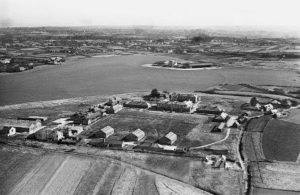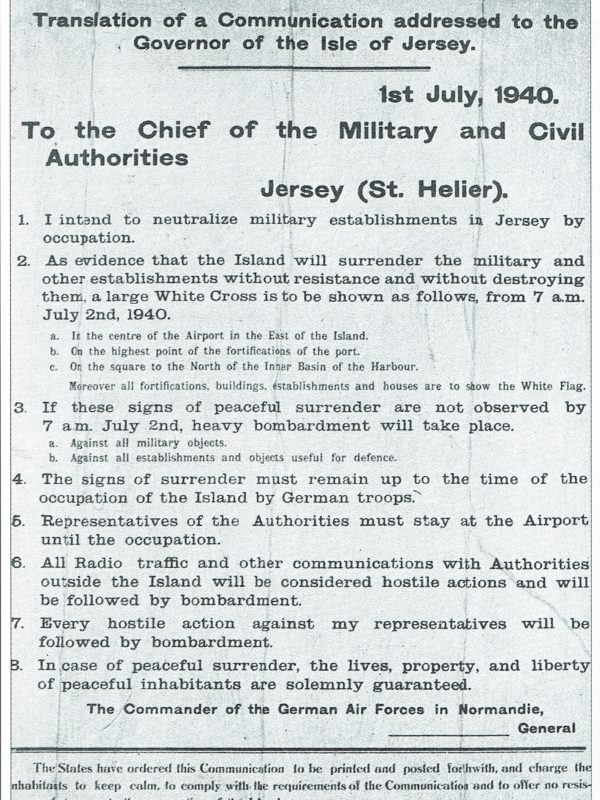A few years ago, my father, Silvanus Yates, wrote down what he remembered about that time, when he and the rest of the family were evacuated to England with the British military forces in the Island. Here is an extract of what he said (and which has not hitherto been published):
“During 1938, the British Army had set up a technical school at St.Peter’s Barracks in Jersey to train boy soldiers from the age of fourteen as artificers for the Royal Army Service Corps. They were to be trained as motor mechanics, fitters, electricians, turners, joiners, coppersmiths, in fact all trades needed to keep a mechanised army mobile. They also received tuition in English, Maths, Geography, Technical Drawing etc.
My father was a sergeant instructor at the school and we lived in married quarters at the barracks right next to the perimeter fence at Jersey Airport which was adjacent to the barracks on the north and east sides (see photo below).
My first recollection of the war was a Sunday afternoon tea. My parents were entertaining the corporal telephonist from the Adjutant’s office and he was entertaining us with his account of how he had received the VERY IMPORTANT ORDERS from brigade office that morning; what the Adjutant did, what the Commandant said and so on. It was September 3rd 1939.
My not quite five year old ears heard words like Germans, war-footing, enemy action, bombers, air-raids for the first time. It all seemed very exciting!!
………
One of the next things that comes to mind is that my father having to do some night duty with a squad of 6 to 8 men armed with rifles and two Lewis guns to defend the airfield in case of enemy attack.
Slit trenches were dug around the edge of the football field in front of our quarters. Things were coming to a head and although I didn’t know it at the time, Dunkirk had fallen, the Germans were well into Normandy and were attacking St. Malo and advancing along the adjacent coast towards Cherbourg.
My mother said that tonight we must sleep in the slit trench. No problem. No sense of fear or anxiety. Mum knows best. All the kids have to do this I suppose. Quite exciting really. Isn’t it marvellous that five years olds have complete confidence in grown-ups!! I was 5 years 9 months and my brother was 21 months old. Obviously the barracks and the airfield were considered to be prime military targets.
I remember being woken up by boots jumping into our trench and laughing and loud talking and people saying “Ssshh, the children!!”. There was a mini-Dunkirk operation going on and the local boats were bringing British troops from St Malo to Jersey and the boots that had woken me up belonged to 3 of these soldiers just arrived. Years later my mother told me that it hadn’t been too much of an ordeal and that sometime during the night, the bar of the Sergeants’ Mess had been cleared and the contents distributed amongst the occupants of the slit trenches to keep their spirits up.
This was the night of the 18th-19th June 1940. ….. Very early in the morning we went to the harbour and boarded the S.S Brittany with the British Army regulars and the boy soldiers from St Peter’s Barracks. ………”
So although my paternal grand-parents evacuated with their two young sons, my paternal great-grandmother stayed in Jersey, as indeed did my maternal grand-parents and my mother, who was also a small child at the time. (I will pass on some of her recollections in due course.)
The British Government had originally intended to defend the Island and many troops had arrived in Jersey from the 16th, but with the surrender of France imminent, it decided to demilitarise the Island and hence why forces’ families like my grandfather’s started to leave on the 19th, together with soldiers who had arrived only days before. The last of the military forces left on the 21st June. 23,000 of the 50,000 civilian population registered to evacuate in ships organised by the British Government, but in the subsequent days, only 6,600 chose to do so before the last boat finally sailed from St Helier, leaving a civilian population all but cut loose from Britain.
An uneasy calm returned to the Island, and it was declared an “open town”, but this was not properly communicated to the Germans who were now in full control 15 miles away in France. On Friday the 28th June, the German Luftwaffe bombed and machine gunned both Jersey and Guernsey, killing and wounding many islanders, in an attack designed to test the Islands’ air defences, a prudent step for any advancing force in the absence of knowing that the Islands were now defenceless.
After a nervous weekend for Islanders anticipating further attacks, the Germans dropped an ultimatum in the early hours of Monday the 1st July demanding that the Jersey surrender by 7am the next day. The States of Jersey held an emergency sitting in the morning and agreed to comply with the ultimatum. It was ordered that the ultimatum be translated and printed for distribution around the Island. By 4.30pm, the first Germans had landed at Jersey Airport (a day earlier than expected), and without any resistance, and for a large part of the population in the countryside, unaware of the ultimatum, five years of occupation began.
Marc Yates
History Alive! & Jersey Military Tours

